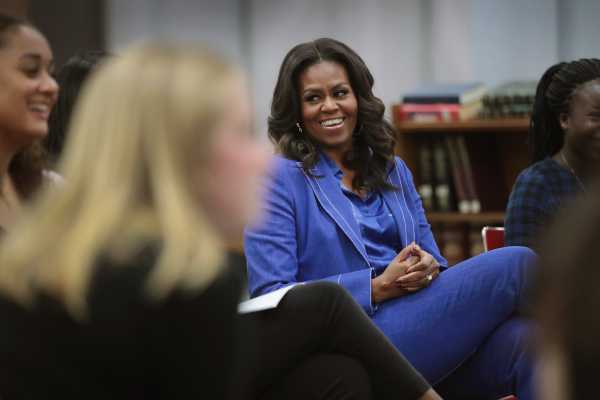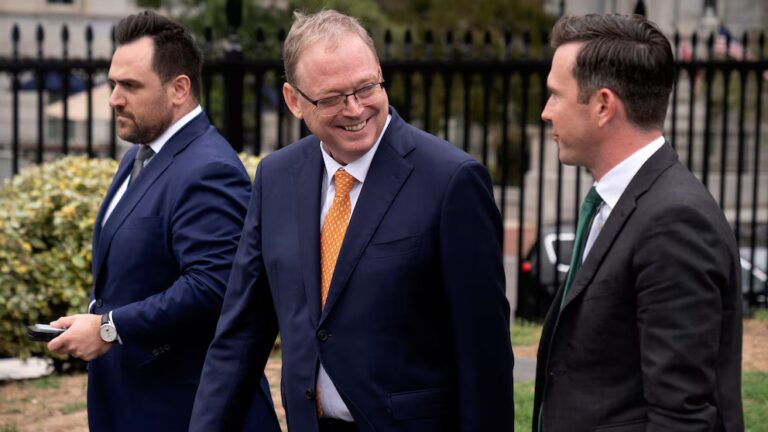
Michelle Obama joined the ranks of former first ladies turned authors on Tuesday with the launch of her new memoir, Becoming.
During her husband’s presidency, Michelle Obama was nearly always more popular than he was. She was a master at walking what Vox’s Constance Grady calls the “First Lady Tightrope” — being effective without being threatening; supporting her husband while keeping up a separate identity — and that balancing act carries over to her memoir.
Becoming is a book that takes few risks, as Grady writes: “It is for the most part a safe and anodyne political memoir that does not aspire to any more ambitious territory. But it is enormously effective at distilling Obama’s poise, intelligence, and warmth into a single 421-page package.”
It also lets readers in on a few things — including Obama’s thoughts on President Donald Trump, her use of assisted reproductive technology, her experience with code-switching, and more.
Here are five takeaways from the book.
Obama was ambivalent about her husband running for president and didn’t think he’d win
Before Barack Obama became president of the United States a decade ago, he had an important task to complete: getting his wife’s approval to run for the White House.
Michelle Obama writes in the memoir that she never expected America to elect a black man for president. Though she loved her husband and “had faith in what he could do,” she writes that part of why she let him run is because she believed he wouldn’t make it too far in the race.
“I said yes, though I was at the same time harboring a painful thought, one I wasn’t ready to share: I supported him in campaigning, but I also felt certain he wouldn’t make it all the way,” she writes. “He spoke so often and so passionately of healing our country’s divisions, appealing to a set of higher ideals he believed were innate in most people. But I’d seen enough of the divisions to temper my own hopes.
“Barack was a black man in America, after all. I didn’t really think he could win.”
Eventually, though, other factors also contributed to Michelle agreeing to Barack’s presidential run: She knew her husband was surrounded by a team of “good, smart people.” And she believed he would be a kind president who would better the lives of millions of people — and that it was worth putting her own needs, and the needs of their daughters, aside in service of that vision.
Obama reveals she had a miscarriage and had her daughters using assisted reproductive technology
In Becoming, Michelle Obama let readers in on one of the couple’s most intimate stories to date: They had a miscarriage and went on to use in vitro fertilization, or IVF, to conceive their two daughters 20 years ago.
The former first lady opened up about a miscarriage that left her “physically uncomfortable and cratered any optimism we felt.” The event, she wrote, left them feeling alone, “broken” and “failed,” but they decided to turn to IVF and have Malia, now 20, and later Sasha, 17.
As Vox’s Julia Belluz notes, about 2 percent of all US births involve some kind of assisted reproductive technology, while miscarriages are the most common complication in pregnancy:
Trump is not a major focus of the memoir, but Obama makes every word on him count
Obama writes that she’ll “never forgive” Trump for putting her family at risk. And she doesn’t mince words when talking about the current president:
Obama on Trump’s efforts trying to doubt the president is a US citizen:
Finally, on the Trump administration’s impact:
Obama was accused of “talking white” when she was younger, and that prepared her for the challenges that came with Barack’s presidential run
Early in the book, Michelle Obama is not afraid to highlight how she was questioned about her identity as a child, navigating multilayered expectations about gender and race.
One moment came during her childhood in Chicago, when she was sitting with other young girls. “At one point one of the girls, a second, third, or fourth cousin of mine, gave me a sideways look and said, just a touch hotly, ‘How come you talk like a white girl?’
“The question was pointed, meant as an insult or challenge, but it also came from an earnest place. It held a kernel that was confusing for both of us. We seemed to be related but of two different worlds.”
Though Obama never explicitly mentions this in the memoir, she discusses the complexities of code-switching: a term used to describe the ways people of color and those from other marginalized groups often adjust their language, behavior, and even appearance to navigate certain social situations or audiences, as Vox’s P.R. Lockhart writes.
Although President Obama tried to quiet narratives about code-switching, Michelle writes, “America would bring to Barack Obama the same questions my cousin was unconsciously putting to me that day on the stoop: Are you what you appear to be? Do I trust you or not?”
Michelle Obama left her job so her husband could be president. Will Barack now take a step back to let her shine?
Barack and Michelle Obama are a high-profile version of what journalist Hanna Rosin has termed the “seesaw marriage,” in which partners take turns stepping back from their careers to let the other shoot for the stars and have a shot at self-actualization.
Though Michelle Obama stepped away from her career when her husband took office in 2009, Barack Obama made personal sacrifices for the family a lot earlier. When she had doubts about leaving a career in corporate law to pursue an opportunity as assistant to the mayor of Chicago, she says in the memoir that Barack “was the lone voice telling me to just go for it, to erase the worries and go toward whatever I thought would make me happy.”
During his political campaigns, though, the seesaw of their marriage tipped toward him; Obama writes that “it was almost as if every day he were forced to cast another vote, between family and politics, politics and family.”
As Vox’s Anna North writes, seesaw marriages are becoming increasingly more common, and they’re just the model the couple might use to witness Michelle Obama’s breakthrough career comeback:
Sourse: vox.com






